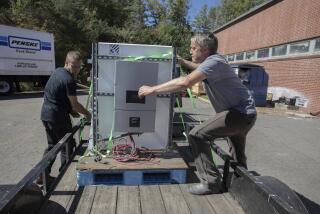Neighborly approach aids recovery
PORT CHARLOTTE — The shards of glass crunched under Lynelle Murtagh’s flip-flops as she walked through the tattered frame of what used to be her home.
In the 18 years since she and lifelong friend Denisebernadette Clark came to Beeney Road, the three-bedroom ranch house was where they had entertained their children, thrown parties with friends, cared for Clark’s dying mother.
Now it lay buckled in on itself, palm trees poking through the smashed front windows, insulation hanging in streamers from the torn ceiling, pieces of shattered furniture cluttering the floor. The aluminum skeleton of the lanai lay at the bottom of the pool, where scattered shingles and clods of earth had turned what used to be clear blue water a murky tea brown.
A neighbor’s boat had plowed into the garage, and an anchor of unknown provenance had turned up in the Florida room. But the urn containing the ashes of Clark’s mother had gone missing.
“I haven’t cried,” said Clark, sitting on an overturned china cabinet. “It’s too overwhelming right now.”
Four days after Charley tore through the community, packing 145-mph winds that left hundreds homeless, life was returning -- tentatively -- to Beeny Road.
The normally quiet street runs the ordinarily tranquil canal that connects Charlotte Harbor with Edgwater Lake. The retirees and snowbirds who for decades have lived alongside one another in the ranch houses here had enjoyed a golden age of neighborly friendship, developed over leisurely afternoons shared in each other’s back yards, watching the dolphins in the canal while the sun set in the distance.
But now the hurricane had cleaved their lives in two. Like the survivors of other disasters, now they would divide their experiences into the time before and the time after, a difference marked not only by the things lost, but the knowledge gained, of how quickly so much could be taken away.
“It’s like a death,” Murtagh said. “It’s like a death in the family.”
On Tuesday, the residents of Beeney Road -- both year-rounders and winter people coming to check on their second homes -- picked through the wreckage and packed up belongings.
The street, still without water or power, was a tangle of uprooted trees, tottering utility poles and downed power lines. Roofs were peeling open or gone altogether. A sports car held up a collapsed carport, dry-docked boats had drifted from their driveways, and a litter of shingles, strips of aluminum and simple garbage, like the detritus of a particularly violent ticker-tape parade, covered the ground.
Linda Wallace arrived from West Virginia to find a spear driven into her roof.
“It’s heartbreaking,” said Wallace, a retired flight attendant who has lived on Beeney Road for 25 years. “Most of us are over 60. We’re retired. This is what we’ve settled down to. . . . It’s going to take a lot of work.”
Wallace, whose house -- protected by hurricane shutters -- fared better than most, already had begun that work: supervising the clearing of her own property, checking on the homes of friends yet to arrive and hugging just about everyone she came across.
“This has always been a street where the people have looked after each other,” she said.
It wasn’t just the neighbors. A succession of out-of-towners also passed through, their cars loaded down with food, water and ice for the residents.
Less welcome were the gawkers, some of whom snapped pictures.
“If you don’t live on this street, keep your ass out,” declared a homemade sign spray-painted across a sheet of plywood in one yard. Later Tuesday, it was amended with a plaintive addendum: “Need ice, gas, beer.”
Several residents put up signs naming insurance companies and policy numbers to catch the attention of claims adjusters as they made their rounds.
“Everybody always says, ‘Thank God nobody was hurt. Everything can be replaced,’ ” said Murtagh, a retired postal worker. “But you can’t replace pictures of the loved ones that are gone. You can’t replace heirlooms. You can’t replace the little things that friends have given you over the years.”
Doug Rogers came down from Virginia to survey the damage to his two-bedroom ranch house. He found a bramble of metal and debris jamming his front doorway, a skylight smashed, a front room caved in, the ceiling buckled and the new carpet ruined. He’d lost some photographs, some coins and an antique mirror.
Still, the retired airline pilot was joking his way through the day.
“It’s a terrible thing you wouldn’t wish on anyone,” he said. “I’m trying to keep as positive an outlook as I can. There’s nothing you can do about it, but fix it.”
Matthew Hay Brown can be reached at 787-729-9072 or mhbrown@tribune.com.
More to Read
Sign up for Essential California
The most important California stories and recommendations in your inbox every morning.
You may occasionally receive promotional content from the Los Angeles Times.










